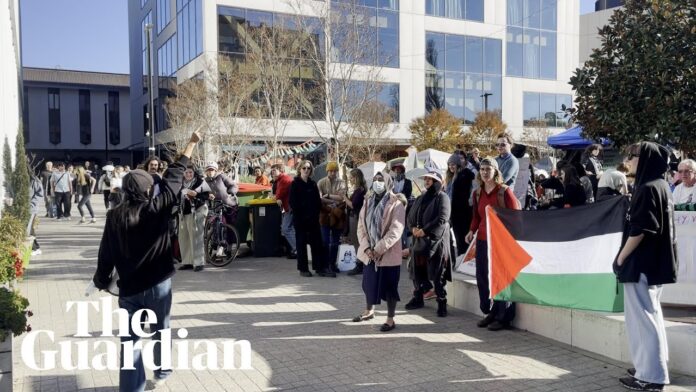Students at Australian National University defy orders to disband the encampment, citing the right to protest
Pro-Palestine protesters at the Australian National University (ANU) have vowed to resist eviction orders, risking potential arrest after university security guards and police descended on their makeshift encampment. The protesters gathered at the Kambri Tent Encampment, received a vacate order on Monday morning, mandating them to leave the area by noon on Tuesday.
The university cited safety concerns as the primary reason for the eviction. More than 20 university security guards, accompanied by a heavy police presence, arrived at the encampment at 8 a.m. on Monday to enforce the order. Students were informed that the encampment posed an “unacceptable safety risk,” with Kambri lawns designated as an evacuation point.
Tensions escalated as approximately 150 protesters formed a human circle around the main tent, erecting a makeshift barricade. Police negotiators arrived at the scene shortly after midday, but officers left the campus around 2 p.m. after delivering the eviction deadline. Despite the order, the protesters have the option to relocate to nearby lawns on North Rd, in front of ANU’s Engineering Building.
The university’s Facilities & Services Division director, Jeremy Matthew, issued the vacate order via a letter to the protesters. The letter cited a “disruptive fire evacuation” on May 21 that raised “serious safety concerns affecting the good order on campus and in that zone.” The letter emphasized the university’s authority to maintain order and the necessity of removing all tents and encampment structures.
However, the protesters have chosen to defy the order. “The police have come and told us we need to leave but we as a collective have decided to stay,” one student explained in a video shared by the Instagram account @anu4palestinee. “There are hundreds of people here… we will not be moved, we will be staying at Kambri.”
Posts from the protester group have accused ANU security of being “aggressive” and preventing legal observers and encampment members from accessing their personal belongings. The university, however, maintains that the encampment must be removed due to safety risks. ANU’s statement expects compliance with the direction, warning that failure to comply will result in disciplinary action.
The university clarified that the vacate order does not prevent students from protesting. “To be clear, as has been the case since the encampment commenced, we have not directed any of our students to stop protesting,” the statement read. “They may continue to do so as long as it is respectful, peaceful, and abides by our codes of conduct.”
Analysis:
The standoff at ANU highlights the complex dynamics between protest rights and institutional safety regulations. The university’s decision to issue a vacate order stems from a fire evacuation incident on May 21, which raised concerns about the safety of the encampment. The administration’s actions reflect a balancing act between ensuring campus safety and upholding students’ rights to protest.
Politically, the pro-Palestine encampment at ANU mirrors broader global protests and movements advocating for Palestinian rights. These protests often face significant challenges, including opposition from institutional authorities and varying levels of support from the public. The students’ decision to resist eviction underscores their commitment to their cause, despite potential legal repercussions.
Sociologically, the encampment represents a microcosm of student activism and its role in broader social movements. University campuses have historically been sites of political engagement and dissent. The protesters’ actions at ANU continue this tradition, highlighting the role of young people in advocating for social justice issues.
Economically, the university’s handling of the encampment and the associated security measures incur costs. These costs, coupled with potential disruptions to campus activities, influence the administration’s decision-making process. Balancing these economic considerations with the need to respect students’ rights to protest presents a significant challenge for university authorities.
Locally, the situation has implications for community relations and the university’s reputation. The presence of a large-scale protest and subsequent police involvement can impact the perception of the university within the local community. How the university manages this situation may affect its relationship with students, faculty, and local residents.
From a gender and minority perspective, the pro-Palestine movement often intersects with issues of representation and marginalization. The students’ protest at ANU highlights broader concerns about the rights and treatment of marginalized communities, both within and outside the university setting. Ensuring that these voices are heard and respected is crucial in addressing systemic inequalities.
Theoretical perspectives relevant to this story include theories of social movements and institutional response. The protesters’ actions align with theories of collective behaviour and grassroots activism, where individuals come together to advocate for a common cause. The university’s response reflects institutional mechanisms for maintaining order and addressing dissent within an organizational framework.
In conclusion, the ANU standoff reflects broader themes of protest, institutional authority, and social justice. The university’s actions and the protesters’ resistance highlight the ongoing negotiation between safety, rights, and advocacy. The outcome of this situation will have lasting implications for campus politics and the broader discourse on protest and activism.
